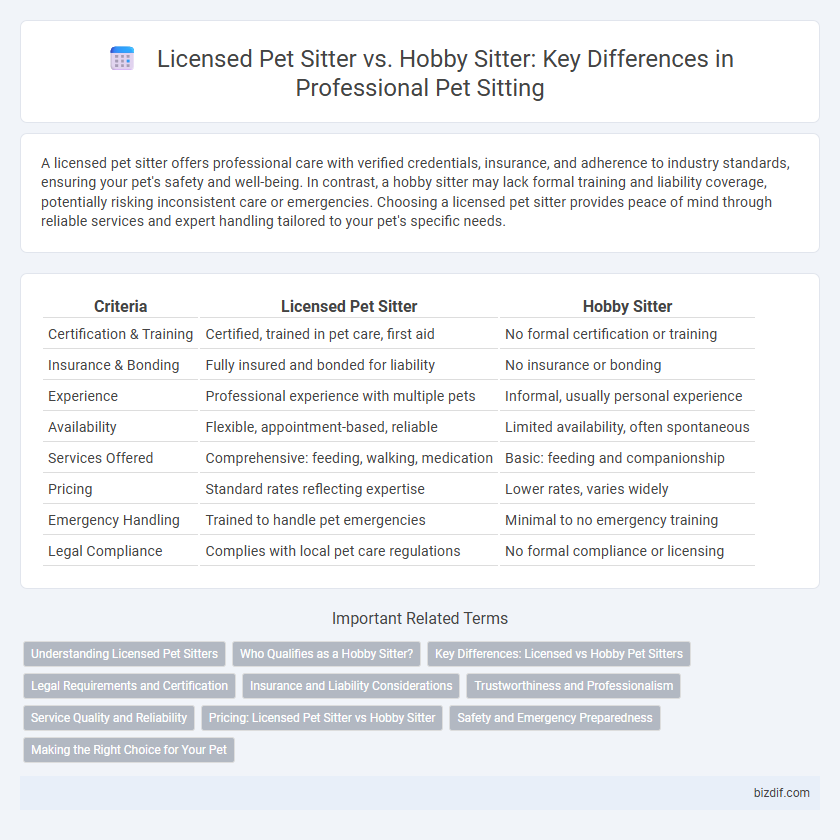A licensed pet sitter offers professional care with verified credentials, insurance, and adherence to industry standards, ensuring your pet's safety and well-being. In contrast, a hobby sitter may lack formal training and liability coverage, potentially risking inconsistent care or emergencies. Choosing a licensed pet sitter provides peace of mind through reliable services and expert handling tailored to your pet's specific needs.
Table of Comparison
| Criteria | Licensed Pet Sitter | Hobby Sitter |
|---|---|---|
| Certification & Training | Certified, trained in pet care, first aid | No formal certification or training |
| Insurance & Bonding | Fully insured and bonded for liability | No insurance or bonding |
| Experience | Professional experience with multiple pets | Informal, usually personal experience |
| Availability | Flexible, appointment-based, reliable | Limited availability, often spontaneous |
| Services Offered | Comprehensive: feeding, walking, medication | Basic: feeding and companionship |
| Pricing | Standard rates reflecting expertise | Lower rates, varies widely |
| Emergency Handling | Trained to handle pet emergencies | Minimal to no emergency training |
| Legal Compliance | Complies with local pet care regulations | No formal compliance or licensing |
Understanding Licensed Pet Sitters
Licensed pet sitters undergo formal training and certification, ensuring they meet professional standards in animal care, safety, and emergency handling. They carry liability insurance and adhere to local regulations, providing pet owners with verified credentials and peace of mind. Unlike hobby sitters, licensed professionals maintain clear contracts and offer consistent services backed by industry experience and accountability.
Who Qualifies as a Hobby Sitter?
A hobby sitter typically cares for pets occasionally without formal licensing or professional training, often providing services to friends, family, or neighbors. Unlike licensed pet sitters, hobby sitters do not meet regulatory requirements or hold certifications in animal care or pet first aid. Their experience varies widely, and they usually do not carry insurance or have access to emergency veterinary partnerships.
Key Differences: Licensed vs Hobby Pet Sitters
Licensed pet sitters have completed formal training, obtained certifications, and comply with legal and insurance requirements, ensuring professional care and accountability. Hobby sitters offer pet care without formal qualifications or regulatory oversight, which may pose risks related to safety, reliability, and expertise. Choosing a licensed pet sitter guarantees adherence to industry standards, background checks, and emergency preparedness that hobby sitters typically lack.
Legal Requirements and Certification
Licensed pet sitters meet legal requirements through formal certification, background checks, and specialized training to ensure responsible care and compliance with regulations. Hobby sitters typically lack official licenses or certifications, posing potential risks related to insurance coverage and liability. Choosing a licensed pet sitter guarantees adherence to legal standards and professional accountability.
Insurance and Liability Considerations
Licensed pet sitters carry professional insurance policies that protect against damages, injuries, or losses that may occur during pet care, ensuring liability coverage for both the sitter and the pet owner. Hobby sitters often lack formal insurance, increasing the risk of financial responsibility for accidents or emergencies. Choosing a licensed pet sitter with verified insurance can provide peace of mind and legal protection in case of unforeseen incidents.
Trustworthiness and Professionalism
Licensed pet sitters demonstrate higher trustworthiness and professionalism due to formal training, certification, and adherence to industry standards. Hobby sitters often lack verified credentials and may not carry insurance, increasing the risk for pet owners. Choosing a licensed pet sitter ensures accountability, reliable care, and peace of mind for pet owners.
Service Quality and Reliability
Licensed pet sitters offer professional service quality backed by formal training, certifications, and adherence to industry standards, ensuring reliable care and safety for pets. Hobby sitters, while often passionate, may lack standardized skills and insurance, which can impact consistency and emergency preparedness. Choosing a licensed pet sitter enhances trust and accountability, providing pet owners with peace of mind through verified expertise and dependable service.
Pricing: Licensed Pet Sitter vs Hobby Sitter
Licensed pet sitters typically charge higher rates than hobby sitters due to their professional training, certifications, and insurance coverage. Hobby sitters often offer more affordable pricing but may lack formal qualifications and comprehensive care guarantees. Investing in a licensed pet sitter ensures premium service quality and peace of mind, reflecting in their pricing structure.
Safety and Emergency Preparedness
Licensed pet sitters undergo comprehensive training in safety protocols and emergency response, ensuring pets receive professional care tailored to their health needs. Hobby sitters often lack formal certification, which may result in inadequate handling of emergencies or safety risks. Choosing a licensed pet sitter enhances pet protection through verified expertise and access to emergency resources.
Making the Right Choice for Your Pet
Choosing a licensed pet sitter ensures professional care with verified credentials, insurance, and adherence to industry standards, which guarantees your pet's safety and well-being. Hobby sitters may offer affordable or casual care but often lack formal training, liability coverage, and consistent availability, posing a potential risk for your pet's health and happiness. Prioritizing licensed pet sitters supports reliable, accountable service tailored to your pet's specific needs, promoting peace of mind during your absence.
Licensed pet sitter vs Hobby sitter Infographic

 bizdif.com
bizdif.com